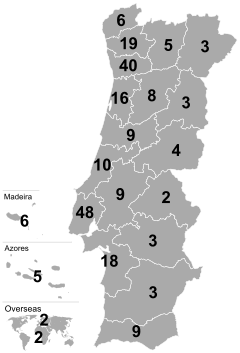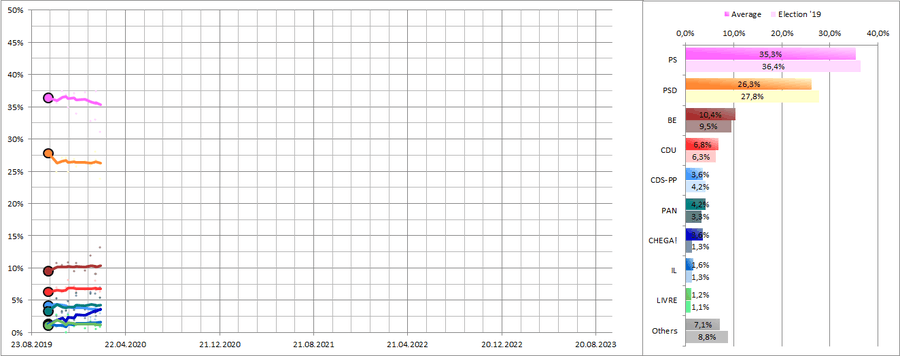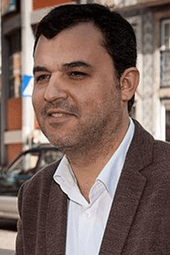Next Portuguese legislative election
The Next Portuguese legislative election will take place on or before 8 October 2023 to elect members of the Assembly of the Republic to the 15th Legislature of Portugal. All 230 seats to the Assembly of the Republic will be at stake.
| |||||||||||||||||||||||||||||||||||||||||||||||||||||||||||||||||||||||||||||||||||||||||||||||||||||
230 seats in the Assembly of the Republic 116 seats needed for a majority | |||||||||||||||||||||||||||||||||||||||||||||||||||||||||||||||||||||||||||||||||||||||||||||||||||||
|---|---|---|---|---|---|---|---|---|---|---|---|---|---|---|---|---|---|---|---|---|---|---|---|---|---|---|---|---|---|---|---|---|---|---|---|---|---|---|---|---|---|---|---|---|---|---|---|---|---|---|---|---|---|---|---|---|---|---|---|---|---|---|---|---|---|---|---|---|---|---|---|---|---|---|---|---|---|---|---|---|---|---|---|---|---|---|---|---|---|---|---|---|---|---|---|---|---|---|---|---|---|
| Opinion polls | |||||||||||||||||||||||||||||||||||||||||||||||||||||||||||||||||||||||||||||||||||||||||||||||||||||
| |||||||||||||||||||||||||||||||||||||||||||||||||||||||||||||||||||||||||||||||||||||||||||||||||||||
| |||||||||||||||||||||||||||||||||||||||||||||||||||||||||||||||||||||||||||||||||||||||||||||||||||||
Background
Politics of Portugal
The President of Portugal has the power to dissolve the Assembly of the Republic by their own will. Unlike in other countries, the President can refuse to dissolve the parliament at the request of the Prime Minister or the Assembly of the Republic and all the parties represented in Parliament. If the Prime Minister resigns, the President must appoint a new Prime Minister after listening to all the parties represented in Parliament and then the government programme must be subject to discussion by the Assembly of the Republic, whose members of parliament may present a motion to reject the upcoming government.
Leadership changes
Liberal Initiative
Early in December 2019, the Liberal Initiative (IL) elected a new leader after their previous leader, Carlos Guimarães Pinto, stepped down. Their sole MP, João Cotrim de Figueiredo, was elected as leader with 96% of the votes in the party's convention.[1]
Social Democratic Party
The Social Democrats (PSD), the largest opposition party, held a two-round leadership election on 11 January and 18 January 2020. Three candidates were in the race: incumbent PSD leader Rui Rio, former PSD parliamentary caucus leader Luís Montenegro and current Deputy Mayor of Cascais Miguel Pinto Luz.[2] Around 40,000 party members, out of almost 110,000, were registered to vote.[3] In the first round, on 11 January, Rui Rio polled ahead with 49% of the votes against the 41.4% of Luís Montenegro and 9.6% of Miguel Pinto Luz, with both Rio and Montenegro qualifying for a second round.[4] A week later, on 18 January, Rui Rio was re-elected as PSD leader with 53.2% of the votes, against the 46.8% of Luís Montenegro.[5] In both rounds, turnout of registered members achieved almost 80%.
CDS – People's Party
CDS – People's Party also elected a new leader after former leader Assunção Cristas stepped down after the party's worst result ever in a general election in the 2019 elections. Five candidates were in the race: People's Youth leader Francisco Rodrigues dos Santos, current CDS MP from Aveiro João Almeida, former MP Filipe Lobo d'Ávila, Abel Matos Santos and Carlos Meira. The new leader was elected in a party congress between 25 and 26 January 2020.[6] In that congress, in Aveiro city, Francisco Rodrigues dos Santos was elected leader with 46.4% of the delegates votes, against the 38.9% of João Almeida and 14.5% of Filipe Lobo d'Ávila.[7]
Date
According to the Portuguese Constitution, an election must be called between 14 September and 14 October of the year that the legislature ends. The election is called by the President of Portugal but is not called at the request of the Prime Minister; however, the President must listen to all of the parties represented in Parliament and the election day must be announced at least 60 days before the election.[8] If an election is called during an ongoing legislature (dissolution of parliament) it must be held at least in 55 days. Election day is the same in all multi-seats constituencies, and should fall on a Sunday or national holiday. The next legislative election must, therefore, take place no later than 8 October 2023.[9]
Electoral system
The Assembly of the Republic has 230 members elected to four-year terms. Governments do not require absolute majority support of the Assembly to hold office, as even if the number of opposers of government is larger than that of the supporters, the number of opposers still needs to be equal or greater than 116 (absolute majority) for both the Government's Programme to be rejected or for a motion of no confidence to be approved.[10]
The number of seats assigned to each district depends on the district magnitude.[11] The use of the d'Hondt method makes for a higher effective threshold than certain other allocation methods such as the Hare quota or Sainte-Laguë method, which are more generous to small parties.[12]
In the 2019 legislative elections, the MPs distributed by districts were the following:[13]
| District | Number of MPs | Map |
|---|---|---|
| Lisbon | 48 |  |
| Porto | 40 | |
| Braga | 19 | |
| Setúbal | 18 | |
| Aveiro | 16 | |
| Leiria | 10 | |
| Coimbra, Faro and Santarém | 9 | |
| Viseu | 8 | |
| Madeira and Viana do Castelo | 6 | |
| Azores and Vila Real | 5 | |
| Castelo Branco | 4 | |
| Beja, Bragança, Évora and Guarda | 3 | |
| Portalegre, Europe and Outside Europe | 2 |
Parties
The table below lists parties currently represented in the Assembly of the Republic.
Opinion polling

Notes
- The Portuguese Communist Party (PCP) and the Ecologist Party "The Greens" (PEV) contested the 2019 election in a coalition called Unitary Democratic Coalition (CDU) and won a combined 6.3% of the vote and elected 12 MPs to parliament.
References
- "João Cotrim Figueiredo eleito presidente da Iniciativa Liberal com 96% dos votos ", Observador, 8 December 2019. Retrieved 5 January 2020.
- "Três candidaturas à presidência do PSD formalmente aceites ", Observador, 2 January 2020. Retrieved 5 January 2020.
- "Pelo menos 40 mil militantes podem votar nas próximas diretas do PSD", Correio da Manhã, 23 December 2019. Retrieved 5 January 2020.
- "Eleições PSD: Rio obteve 49,02% dos votos na 1.ª volta e Montenegro 41,42%", TVI24, 15 January 2020. Retrieved 19 January 2020.
- "Rio é reeleito e mostra-se disposto a gerar unidade no PSD ", Público, 19 January 2020. Retrieved 19 January 2020.
- "Cinco candidatos e doze estratégias. CDS em contagem decrescente para escolher sucessor de Cristas", ZAP, 2 January 2020. Retrieved 5 January 2020.
- "Francisco Rodrigues dos Santos é o novo líder do CDS. Moção teve 46% dos votos ", Público, 26 January 2020. Retrieved 26 January 2020.
- "Archived copy" (PDF). Archived from the original (PDF) on 22 October 2014. Retrieved 7 October 2015.CS1 maint: archived copy as title (link)
- Electoral law to the Assembly of the Republic
- "Constitution of the Portuguese Republic" (PDF). Archived from the original (PDF) on 3 March 2016. Retrieved 29 October 2019.
- "Effective threshold in electoral systems". Trinity College, Dublin. Retrieved 21 October 2015.
- Gallaher, Michael (1992). "Comparing Proportional Representation Electoral Systems: Quotas, Thresholds, Paradoxes and Majorities"
- ""Mapa Oficial n.º 8/2019"" (PDF). CNE - Comissão Nacional de Eleições - Diário da República, 1.a série—N.o 154-12 de agosto de 2019. Retrieved 31 August 2019.
- Livre: "A partir deste momento tudo o que Joacine disser ou fizer na ação política não nos representa", Observador, 31 January 2020. Retrieved 31 January 2020.
- Mais uma saída do PAN. Cristina Rodrigues deixa partido e passa a deputada não inscrita, Sapo, 26 June 2020. Retrieved 26 June 2020.
_2.jpg)
_(cropped%2C_Rui_Rio).jpg)
.png)
_(cropped).jpg)

.jpg)
%2C_cropped.png)